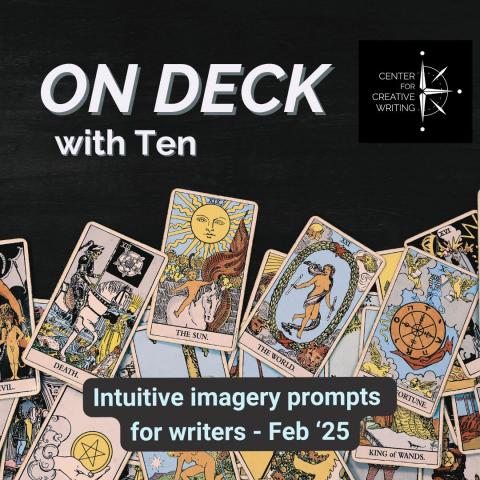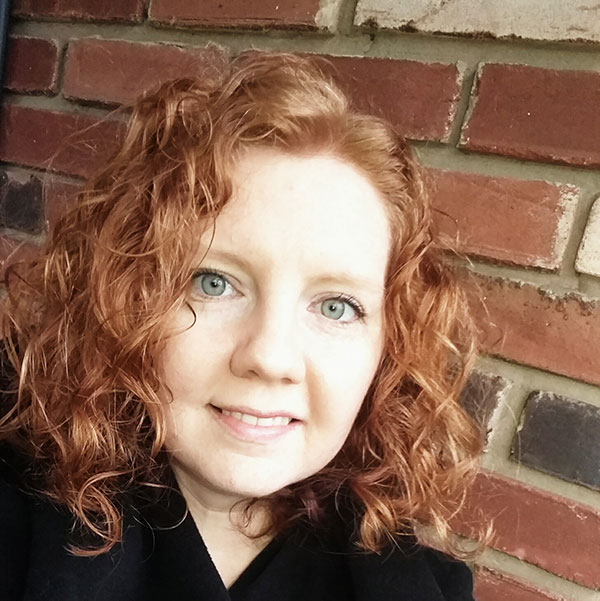
Teneice Durrant, creator of Tarot with Ten, will use various tarot and oracle decks to provide monthly readings for writers with exercises on using imagery and intuition as prompts. February's prompt will be about exploring story elements as they correlate to The Magician.
Using tarot's Magician to develop story elements
Watch and listen to Teneice's tarot reading for writers, or read the transcript of the reading below.
Hi everyone, welcome to another edition of On Deck. My name is Teneice, and we are going to continue on our journey talking about the story structure, the narrative structure of a story, and incorporating tarot into that. Kind of seeing how we can use tarot cards to help us develop characters and plot lines and things like that.
So we are going to start today talking about the first card. Last month, we talked about the Fool and the inciting incident. And this month, we are gonna talk about the next card, which is the number one card, the Magician.
The Magician
This card represents someone who is kind of learning to control the elements and their environment. So the way that I interpret this in terms of developing my character or developing the stories, is that we can see that he, on this table in front of him, has a pentacle, a sword, a wand, and a cup, which represent all four suits in the tarot. He's also holding a scroll in his hand pointing upward, kind of indicating that he privileges knowledge, he believes in knowledge and learning, and it also kind of represents the “as above, so below.”
What challenges the Magician is facing is that he often looks at these four elements that he has as ingredients in a cake, right? So the Magician is the master manifester. He says, here's what I want to come down into reality, into my world, not seeing that he has all of the elements available in front of him to create whatever he wants. So it's like, if he was gonna make a cake, if he wanted a cake and says, “Universe, I want a cake,” and he looks down and he sees eggs and flour and sugar and milk or, you know, whatever you use to mix up the cake, he sees all the ingredients, he just has to put them together. But he's not kind of understanding that he has all the parts to have a cake, but there still has to be some action on his part, right? You can't just manifest the cake and have a cake plopped down into your lap. You have to have the elements, right? You have to use your own knowledge to put that cake together.
So I look at these different elements in terms of the story as different skills, different strengths, that our main character might have that will be useful to them on this journey, but they don't really necessarily know that these skills are useful or helpful, or that they even possess these skills.
So what I want to do today in terms of our writing prompt is to pull a few cards and see what kind of skills, what kind of strengths, what kind of weaknesses are buried deep in our main character. These may be things that they know about, but they don't know how they would be useful, or things that they're not aware of yet that will become useful in their story, okay?
So again, I am using the Morgan Greer deck. This is my favorite deck, but any Rider-Waite-Smith decks are going to look similar, and this is just a little bit different style, okay? So I'm gonna shuffle here, and we're gonna see maybe two or three cards about some hidden skills, strengths, or weaknesses that our character has that we will incorporate into future situations to help them learn in the character development.
Two of Pentacles: Finding balance
Okay, we have Two of Pentacles, the High Priestess in reverse. Let's see if we can get one more. Okay, now I normally don't read reversal cards, but I think when we're doing things like exploring strengths and weaknesses and character development, working with those reverse cards can be something that this will go upright by the time their story is over.
Like that's one of the developments that happens for this character that makes them a better person is, this goes upright, okay? And this, we will take it as something that's unconscious or subconscious that we don't know will be useful or a strength that we don't know the character has yet that's going to reveal itself during the trials and tribulations, okay?
So let's talk about the Two of Pentacles. The Two of Pentacles is all about balance, being able to spin a couple plates at the same time.
Maybe we often think of it as like two jobs, or balancing work and life, work and home, just kind of keeping things going—even though there's a lot happening, they're keeping things going. This isn't a sustainable, long-term way to live, but it can be something beneficial in the short-term. But maybe our character seems to be kind of juggling too many things, too much stuff is going on, or they're trying to do too much in terms of being all the things to everybody, right? So being the carpenter and the cook and the childcare and the sailor and the carpet-maker, all the things.
The High Priestess: Trusting oneself
So they're trying to keep all of their balls in the air, juggling, they're trying to be everything to everyone. And that perhaps is a weakness in the short-term, right? That's a strength, somebody who's able to keep things going in the short-term until a better situation comes up, okay? The High Priestess in reverse would indicate that this person has no real confidence in their ability to trust themselves. The High Priestess is often the card of like intuition and knowing and kind of that gut feeling. So it could be that our main character right now does not trust themselves.
Maybe they thought they had followed their gut one time, and it ended up disastrous. Maybe eventually it gets revealed that that actually wasn't their fault. You know, they thought it was their fault, but somebody else was behind the scenes making it happen, and they should have trusted their gut and they did the right thing.
But for whatever reason right now, our main character does not trust themselves. They don't trust their feelings or their, like I said, their gut reactions or their instincts, okay? So by the time we get through this story, that's one of the major character developments that's going to happen. By the end of the story, our main character is going to know that they can trust themselves, trust their feelings, trust their intuition.
The Hermit: A hidden mentor
And one final card is the Hermit. Now, it is interesting that the hermit is facedown and something that is kind of subconscious that we didn't know, you know, from the get-go.
This is something that gets revealed throughout, you know, the rising action and the different trials and tribulations that our main character has to go through is that the Hermit is the light and the fount of wisdom, but they're not easy to get to, right? This Hermit is at the top of the hill and he's shining that light, that beacon. He's saying, you can make it here, too. You can have this knowledge that I have, but you have to come up here. I'm not gonna, you know, lower myself. I'm not going to decrease the value of this knowledge. This knowledge is worth it and you have to come up here, you have to make the trek up this mountain to have this knowledge. And I'm here and I'm guiding this light, I'm showing you. So it's possible that there's a hidden mentor throughout this journey that maybe the main character doesn't realize is a mentor.
Or maybe the main character becomes a mentor for somebody and they don't realize it, good or bad, right? Maybe they influence younger ones the wrong way, or maybe they are, you know, a guiding light, a kind of steadfast moral position that other characters kind of lean on or lean to when they're going through these hard transformative experiences, okay?
So that is our kind of delve into the Magician and what the Magician means, and also how it can relate to building our story and building our characters. Don't forget that the Magician is the master manifester. He has all the things he needs to create the life that he wants. He just has to recognize that they're there in front of him and make a little effort to put them all together.
What did you think of this tarot reading and the cards as visual prompts for story development? Share with us in the comments, and contact us if you’re interested in working one-on-one with Teneice in part 3 of Writing Toward Balance and Wholeness: Tarot and the Narrative Arc (taking parts 1 and 2 first is not required).
Want to receive tips and inspiration like this in your inbox every Sunday morning? Join our email list community! You will receive weekly advice, a year’s worth of weekly writing prompts as a FREE download, and be eligible to participate in our monthly photo prompt contest for a chance to share an original piece of writing with our community of more than 2,500 writers.
